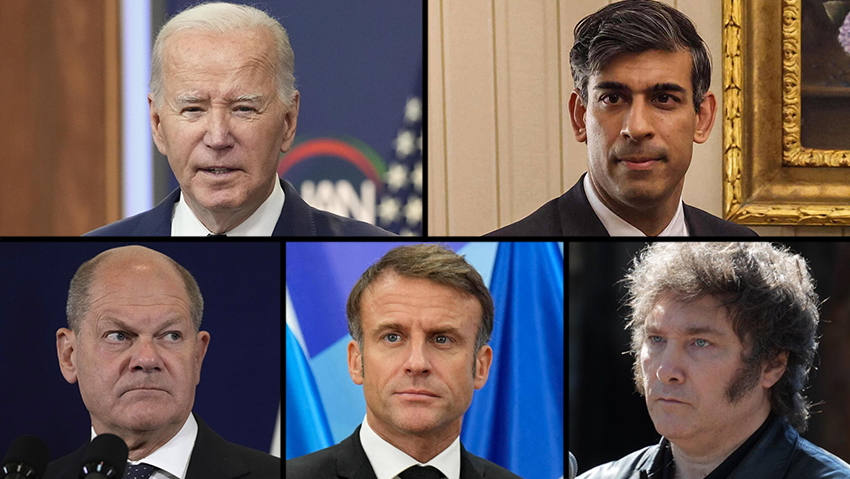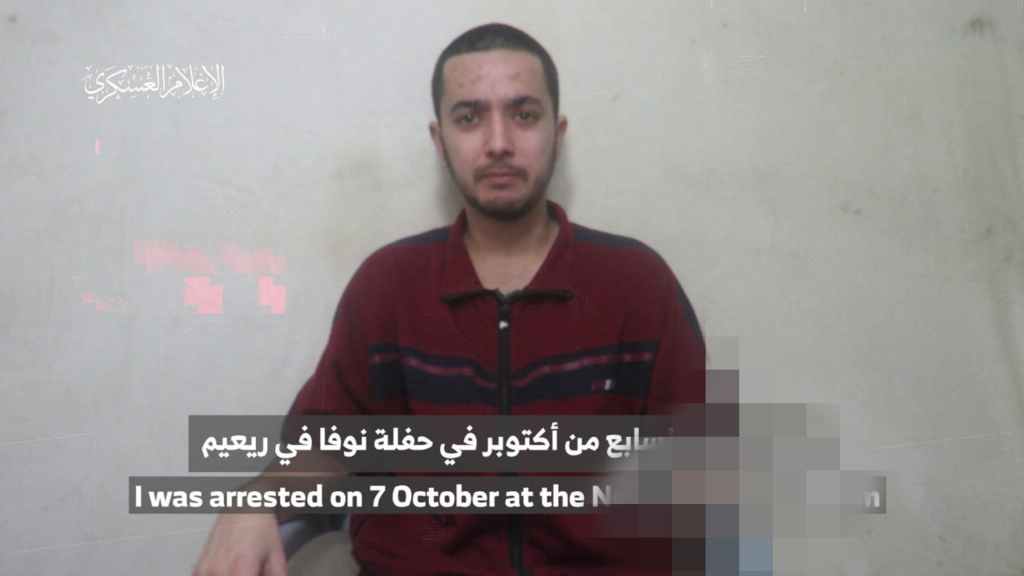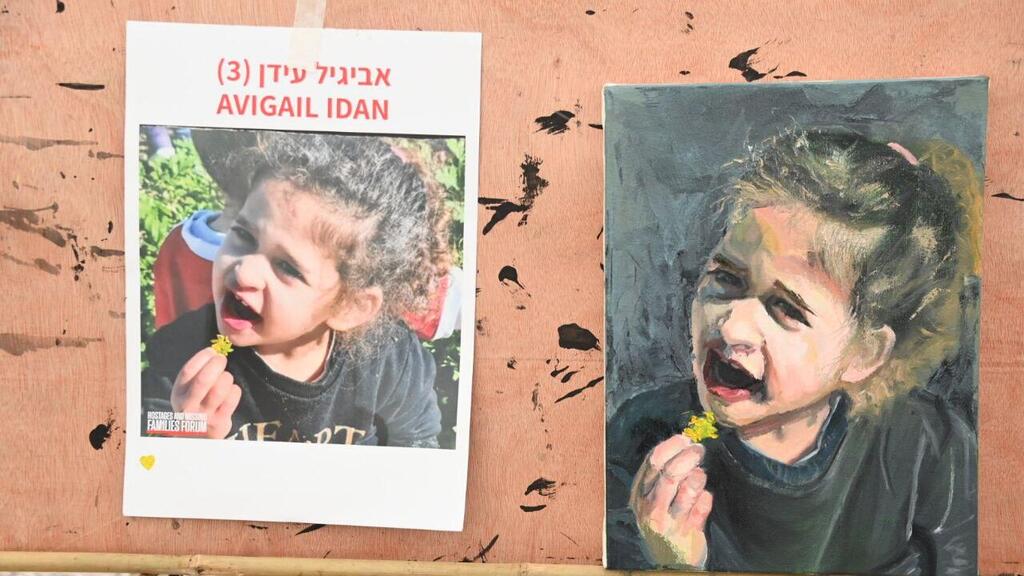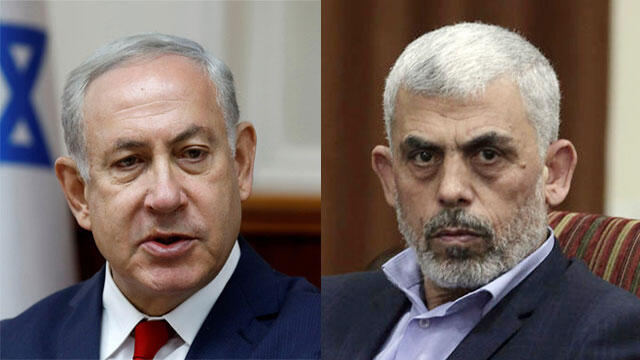Getting your Trinity Audio player ready...
On Thursday, the 202nd day of the war in Gaza, the leaders of 18 countries called on Hamas to release the 133 hostages, which would end the crisis in Gaza.
The 18 signatories were the leaders of the United States, Argentina, Austria, Brazil, Bulgaria, Canada, Colombia, Denmark, France, Germany, Hungary, Poland, Portugal, Romania, Serbia, Spain, Thailand and Britain. The 18 countries all have citizens held by Hamas six months after Hamas launched its October7 assault on southern Israel and killed 1,200 people.
4 View gallery


Some of the world leaders who signed the statement calling for the release of the hostages
(Photos: AP, AFP, Tomer Shunem Halevi)
“We call for the immediate release of all hostages held by Hamas in Gaza for over 200 days. They include our own citizens. The fate of the hostages and the civilian population in Gaza, who are protected under international law, is of international concern,” according to the statement issued by the leaders.
“We emphasize that the deal on the table to release the hostages would bring an immediate and prolonged ceasefire in Gaza, that would facilitate a surge of additional necessary humanitarian assistance to be delivered throughout Gaza and lead to the credible end of hostilities. Gazans would be able to return to their homes and their lands with preparations beforehand to ensure shelter and humanitarian provisions. We reiterate our call on Hamas to release the hostages and let us end this crisis so that collectively we can focus our efforts on bringing peace and stability to the region,” the statement also says.
A senior official in the White House said that the joint statement comes following the release of the video of hostage Hersh Goldberg-Polin, which was received by the White House on Monday - before Hamas made it public - and is currently undergoing a review process with experts. "He was wounded in the hand while his friends from grenades, and we are in contact with the Egyptians and others to get him out and get everyone out," the American official said.
According to the U.S. official, the leader of Hamas in Gaza, Yahya Sinwar, is the one who makes the decisions - and he personally rejected the hostage release deal, thus insisting on keeping him in the category of vulnerable hostages. The official noted that Biden on Wednesday met 4-year-old Abigail Edan - an American and Israeli citizen who was released from Hamas captivity after 50 days, and whose parents were murdered on October 7 - and spent more than an hour with her and members of her family.
"He just let her play like a 4-year-old girl does. She played in the Oval Office, crawled under the Resolute Desk like the famous picture of John F. Kennedy Jr. when he was a child.," the official said. She also played on the White House lawn and in the playground on the premises while the president discussed US efforts to free the hostages with her family, according to the official.
The headquarters of the families of the hostages praised the statement.
"We welcome the statement by world leaders calling for the immediate release of all the hostages, and which puts the issue of the hostages at the top of the world's priorities and call on other leaders to join this call. The statement is the product of hard work carried out by the families of the hostages in recent months in front of decision-makers from all over the world, with the aim of bringing home all the hostages - the living for rehabilitation and the murdered for burial," the families said in a statement.
The senior US official pointed out that it is Hamas that continues to reject deals centered around the hostages that would bring an immediate cease-fire.
“There is a deal on the table that would bring a cease-fire immediately to Gaza with the release of women, wounded, elderly and sick hostages that is ready to go. We have worked it out in meticulous detail and Hamas has rejected that. Because of that, we still have fighting ongoing in Gaza,” according to the official.
The official added that Hamas' claim that Israel does not allow residents to return to the northern Gaza Strip is "false." Under the agreement on the table, during the first weeks of the cease-fire, conditions were set that would allow residents to safely return to northern Gaza and receive humanitarian aid to the United Nations.
"There is great destruction, so you first want to establish safe places. It would be dangerous for the population to return without preparation. This was agreed upon after months of negotiations, including consultation with humanitarian experts. If there is a release of women, the elderly and the sick and there is a cease-fire then conditions will be established that will allow a return residents. That's why Hamas' claim is not true."
Referring to Hamas leader in Gaza, Yahya Sinwar, the American official said: "I think justice will come to him. There were several times when the negotiations made great progress outside with Hamas leaders living in luxury hotels, but Sinwar is the ultimate decision-maker."
According to the official, the question came to Sinwar about "whether he’ll agree to release the vulnerable category of hostages to secure ceasefire and relief for Gazans, and the answer that comes back from Sinwar personally, is ‘No.'”
On the question of whether Prime Minister Benjamin Netanyahu is doing everything to reach a hostage deal, the American official said: "It is a very difficult negotiation. There were times when the Israelis, for one reason or another, did not want to put certain issues on the table. Six weeks ago, I might have given a different answer, but during President Biden's conversation with Prime Minister Netanyahu on the eve of Iran's attack it was a central issue.
“Right now, the core truth is that there’s a deal on the table that meets nearly all of the demands that Hamas has had, including key issues. There were times when we thought that Israel could perhaps give more, but this is a negotiation and there are tactical matters,” the official said. “The view of the Egyptians and the Qataris and those who are fairly deeply involved is that the answer that came back from inside Gaza was totally not constructive.”
“We do see some indications that there might be an avenue here, but I’m not totally confident because a lot of times we hear things from leaders of Hamas outside Gaza that do not reflect the Hamas leadership inside,” the official said. "There is a proposal on the table that is a road map for ending the crisis and Hamas should release these categories and then we can move forward."




